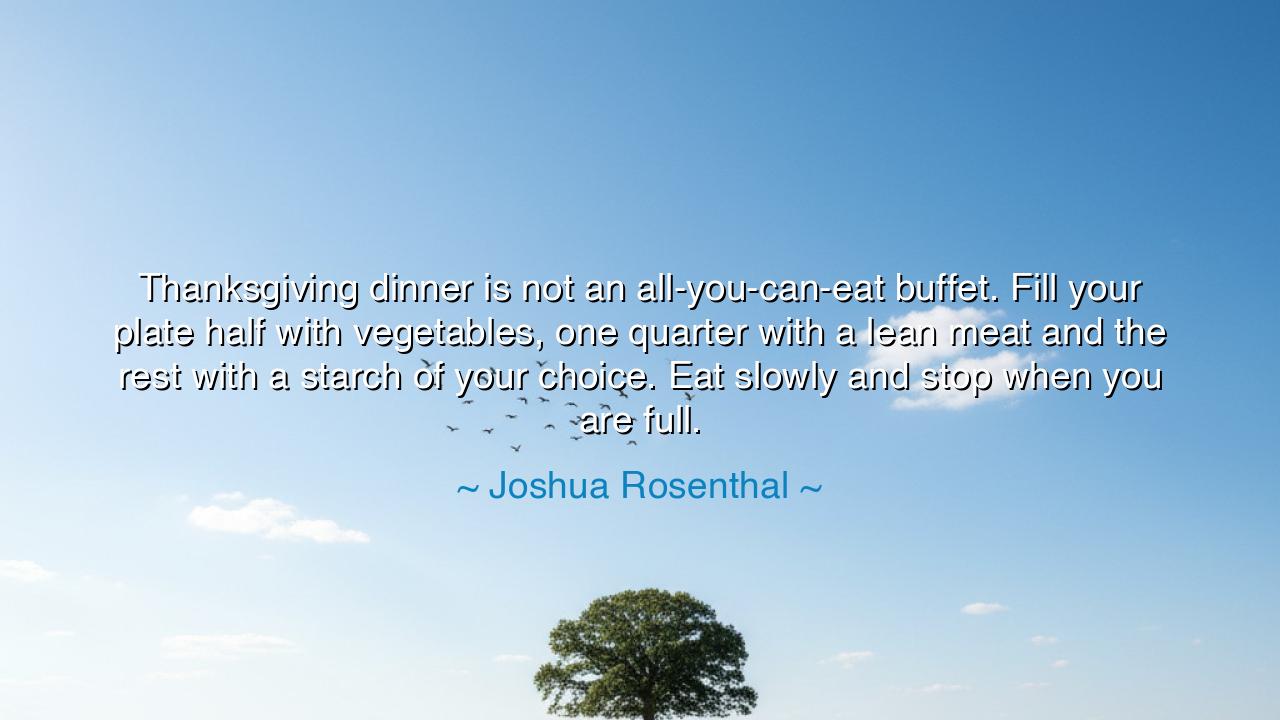
Thanksgiving dinner is not an all-you-can-eat buffet. Fill your
Thanksgiving dinner is not an all-you-can-eat buffet. Fill your plate half with vegetables, one quarter with a lean meat and the rest with a starch of your choice. Eat slowly and stop when you are full.






Joshua Rosenthal, a teacher of nourishment and balance, once declared: “Thanksgiving dinner is not an all-you-can-eat buffet. Fill your plate half with vegetables, one quarter with a lean meat and the rest with a starch of your choice. Eat slowly and stop when you are full.” Though at first his words may sound like practical advice for the holiday table, they carry within them a greater wisdom—a reminder that even in feasting, moderation, mindfulness, and gratitude must reign. For to eat without thought is to fall into excess, but to eat with care is to honor both body and spirit.
The meaning of his teaching rests on the ancient principle of balance. Food is not only pleasure but medicine; it sustains life, strengthens the body, and clears the mind. Yet when feasts become indulgence, they harm rather than heal. By dividing the plate with intention—half in vegetables, a portion of lean meat, and a share of starch—Rosenthal reveals an order that mirrors the harmony of creation itself. Just as the earth is balanced with land, sea, and sky, so too the body thrives when nourished with proportion and wisdom.
History gives us examples of those who recognized this truth. The Greeks, who revered both feast and philosophy, warned against hubris—the arrogance of excess. They celebrated festivals with abundance, yet their sages spoke of the virtue of moderation, for they knew that gluttony dulled the mind and weakened the spirit. In like manner, Rosenthal calls us to approach the holiday table not as a place of reckless indulgence, but as a sacred space where gratitude is expressed not through quantity, but through mindful enjoyment.
The call to eat slowly carries its own deep wisdom. In haste, one consumes without savoring, forgetting that every bite is the fruit of labor—of farmers, of cooks, of the earth itself. To eat slowly is to honor the journey of the food, to give thanks not just in prayer but in practice. Moreover, in stillness the body can listen to its own limits, whispering, “enough.” To stop when full is to resist the pull of greed and to walk in alignment with contentment. This lesson reaches beyond the table, for it is also the way of life: to recognize when enough is enough.
Rosenthal’s words also protect the spirit of Thanksgiving itself. The day is not meant to glorify food, but to glorify gratitude, family, and fellowship. The meal is a vessel for togetherness, not a contest of appetites. By setting limits, by eating with reverence, we keep the feast from becoming a parody of itself. Instead, we preserve its true essence—a reminder of blessings received, of harvest gathered, of bonds renewed at the family table.
The lesson is this: let every feast be tempered with mindfulness, and let every act of eating be an act of thanks. Do not measure abundance by the fullness of your plate but by the fullness of your heart. Practice moderation not as denial, but as freedom—the freedom to enjoy without regret, to celebrate without harm, and to end the meal with joy rather than heaviness.
Therefore, let Joshua Rosenthal’s words endure as a guide to all who feast: portion with wisdom, eat with gratitude, and stop when contentment has been reached. For the feast is not only for the stomach, but for the soul. And he who learns to eat with balance at the table will also learn to live with balance in life, walking the path of strength, clarity, and thanksgiving each day.






AAdministratorAdministrator
Welcome, honored guests. Please leave a comment, we will respond soon